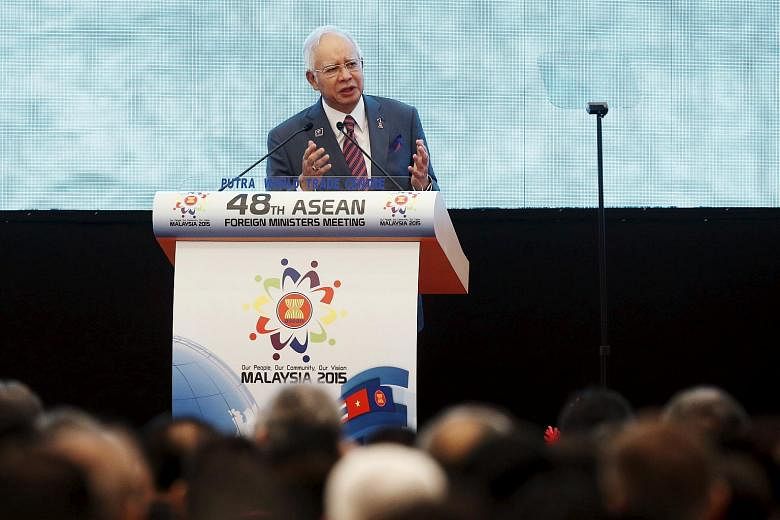(THE STAR/ASIA NEWS NETWORK) Political party funding remains an inconvenient truth for most democracies. Political parties need money to operate and function, run campaigns and create awareness on their policy positions. All of this involves money.
Political parties in Malaysia have always funded themselves through membership subscription, public donations, commercial and investment income and donations from individual and corporate bodies.
Funding is a thorny issue that has been a cause of concern for a long time because of its opaqueness and lack of transparency. This is something all political parties must be ready to accept; we can do better.
The lack of disclosure also stems from the fact that political parties in Malaysia do not receive public funding, i.e. taxpayers money, and also most contributors wish to remain anonymous for fear of reprisals if the party that they support is not successful in an election.
Prime Minister Najib Razak made a brave call when he challenged the opposition parties to declare their sources of funding and said that Barisan Nasional (BN) would be ready do so as well.
This is the first step in right direction. In fact the government has endeavoured with the help of the Malaysian Anti-Corruption Commission (MACC) to regulate political funding and ensure full and frank disclosure of the sources of income of political parties.
Despite mounting itself on the pedestal of competency, accountability and transparency, the opposition Democratic Action Party (DAP), according to BN Strategic Communications Director Rahman Dahlan refused to agree to the proposal by the MACC and Pemandu for full disclosure of the sources of funding of political parties in Malaysia.
According to Datuk Rahman in an article he penned last week: "On 1 December 2010, in a meeting with Transparency International - Malaysia (TI-M) with Pakatan Rakyat's members of parliament, Tian Chua was reported in the minutes of the meeting to have said, 'he feared that full disclosure would hurt their contributors and consequently the financing for the opposition, the fear is that the donors might be prosecuted by the winning coalition for supporting the losing coalition in any general election. This would result in a substantial decline of income source for the loosing coalition'".
DAP's Rasah MP Anthony Loke said essentially the same in a Bar Council Forum about political funding on 29 September 2011.
So it is unfortunate that those trumpeting reforms and transparency in Malaysia refuse to take the proverbial bull by its horns.
I believe those who issue challenges must themselves rise up to the challenge first because if they do not do so then they are not only being disingenuous but also intellectually dishonest.
One can only wait and see if Pakatan Rakyat (or what is left of it) actually seizes the initiative and responds to the Prime Minister's call for all parties to disclose their list of donors and also their sources of funding.
Further, Malaysia must also look at regulating political funding to ensure that political parties operate in a climate of openness and transparency and this will augur well for Malaysia's political development.
There are many models that we can refer to as we seek a best practice or template of political party funding.
In the United Kingdom, political parties receive stipends from the state to run their day-to-day operations and this is to ensure that opposition parties are not placed in a disadvantageous position because the ruling party can avail itself of the civil service.
In the United States, there is a cap on how much an individual or organisation can contribute to a candidate. The maximum contribution that a candidate running for federal office can receive is US$2,500 (S$3,455).
President Barack Obama raised US$ 1.072 billion for his 2012 re-election campaign and challenger Mitt Romney, despite losing, raised US$992.5 million.
Despite the caps on donations, political action committees (PACs) are able to raise millions of dollars with no cap on donations. Hence for example, the billionaire Koch brothers together with their political affiliates were able to spend US$407 million on the 2012 US Presidential Election.
Germany has one of the best models on political funding.
In fact transparency in political funding is so central to German political system after the horrors of Third Reich that it is regulated by Article 21 of the German Basic Law (German Federal Constitution).
Every political party in Germany must present its annual financial report to the Bundestag (lower house of the Federal Parliament) and all donations must be disclosed due to greater scrutiny of larger donations especially those above €50,000 (S$75,317).
In 1984, a constitutional amendment extended the provision of 1949 beyond sources of revenue to include expenses, debts and assets.
Meanwhile, Section 24 of the Political Parties Act had established a practice of including all party units, not just federal headquarters but also regional branches and local chapters.
Political parties in Germany generate income via membership dues, individual and corporate donations and grants from the public purse (public subsidies).
Malaysia can learn from the experience in these three countries but political funding must take into account the membership of each political party as well as the number of seats each party holds in parliament and state legislatures.
A balance must be reached and personal and corporate donations cannot be prohibited as there must be necessary freedom for anyone to contribute to political parties as a means of engaging in the political process but all parties, especially DAP, must agree to full and frank disclosure.
This debate must be advanced and the Election Commission and MACC can take the lead by drawing up broad principles like the need for transparency and disclosure and syndicate this with all political parties and explore a system of public subsidies that will help smaller political parties as well.

